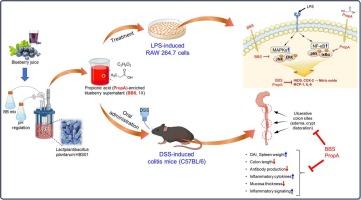Propionic acid-rich fermented blueberry supernatant improves DSS-induced colitis symptoms by regulating inflammatory pathways
IF 4
2区 农林科学
Q2 FOOD SCIENCE & TECHNOLOGY
引用次数: 0
Abstract
This study investigated the anti-inflammatory effects of a short-chain fatty acid (SCFA)-enriched fermented blueberry supernatant (BBS) and its key component, propionic acid (PropA), in both in vitro and in vivo models of colitis. High-performance liquid chromatography confirmed the presence of PropA in BBS at a concentration of 1.86 mg/mL. In LPS-stimulated RAW 264.7 macrophages, BBS significantly reduced nitric oxide, monocyte chemoattractant protein-1, and interleukin-6 production in a dose-dependent manner. Western blotting revealed that BBS suppressed the expression of inducible nitric oxide synthase, COX-2, and NF-κB. In a DSS-induced colitis mouse model, BBS administration significantly improved disease indicators, including body weight loss, colon shortening, and spleen enlargement. Moreover, BBS restored serum IgG and colonic IgA levels and reduced systemic and local inflammatory mediators. These findings highlight the potential of SCFA-enriched fermented blueberry as a functional postbiotic food capable of modulating inflammatory responses through NF-κB and COX-2 signaling pathways in colitis.

富含丙酸的发酵蓝莓上清通过调节炎症途径改善dss诱导的结肠炎症状
本研究研究了富含短链脂肪酸(SCFA)的发酵蓝莓上清(BBS)及其关键成分丙酸(PropA)在体外和体内结肠炎模型中的抗炎作用。高效液相色谱法证实了BBS中PropA的存在,浓度为1.86 mg/mL。在lps刺激的RAW 264.7巨噬细胞中,BBS以剂量依赖的方式显著降低一氧化氮、单核细胞趋化蛋白-1和白细胞介素-6的产生。Western blotting结果显示,BBS可抑制诱导型一氧化氮合酶、COX-2和NF-κB的表达。在dss诱导的结肠炎小鼠模型中,给药BBS可显著改善疾病指标,包括体重减轻、结肠缩短和脾脏肿大。此外,BBS恢复血清IgG和结肠IgA水平,减少全身和局部炎症介质。这些发现强调了富含scfa的发酵蓝莓作为一种功能性后生物食品的潜力,它能够通过NF-κB和COX-2信号通路调节结肠炎的炎症反应。
本文章由计算机程序翻译,如有差异,请以英文原文为准。
求助全文
约1分钟内获得全文
求助全文
来源期刊

Journal of Functional Foods
FOOD SCIENCE & TECHNOLOGY-
CiteScore
9.60
自引率
1.80%
发文量
428
审稿时长
76 days
期刊介绍:
Journal of Functional Foods continues with the same aims and scope, editorial team, submission system and rigorous peer review. We give authors the possibility to publish their top-quality papers in a well-established leading journal in the food and nutrition fields. The Journal will keep its rigorous criteria to screen high impact research addressing relevant scientific topics and performed by sound methodologies.
The Journal of Functional Foods aims to bring together the results of fundamental and applied research into healthy foods and biologically active food ingredients.
The Journal is centered in the specific area at the boundaries among food technology, nutrition and health welcoming papers having a good interdisciplinary approach. The Journal will cover the fields of plant bioactives; dietary fibre, probiotics; functional lipids; bioactive peptides; vitamins, minerals and botanicals and other dietary supplements. Nutritional and technological aspects related to the development of functional foods and beverages are of core interest to the journal. Experimental works dealing with food digestion, bioavailability of food bioactives and on the mechanisms by which foods and their components are able to modulate physiological parameters connected with disease prevention are of particular interest as well as those dealing with personalized nutrition and nutritional needs in pathological subjects.
 求助内容:
求助内容: 应助结果提醒方式:
应助结果提醒方式:


